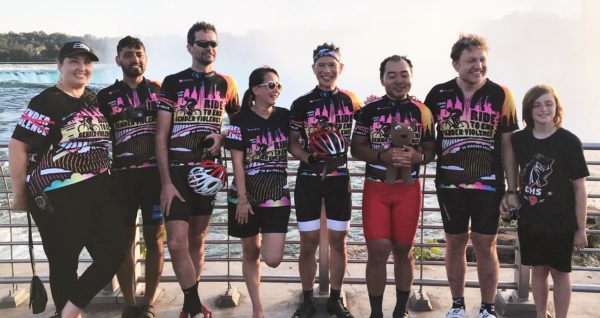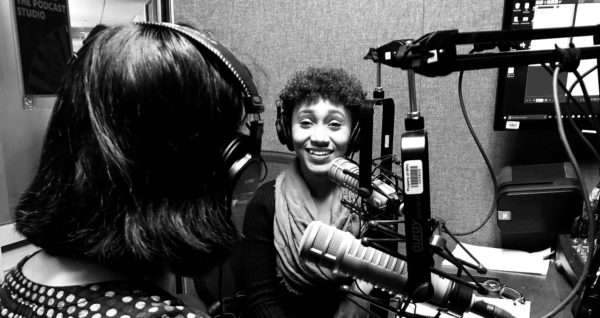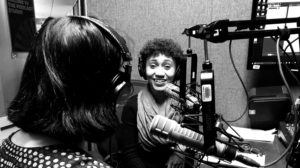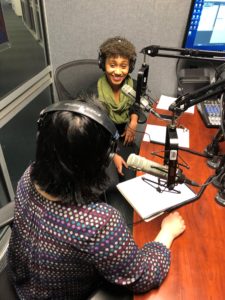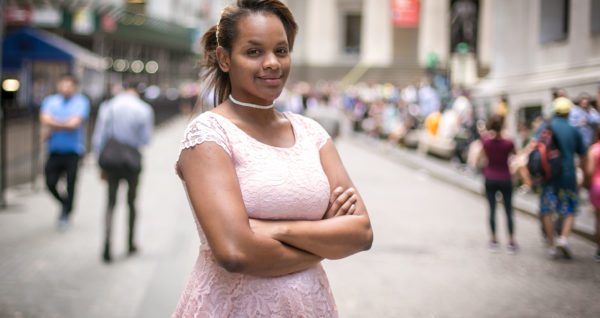An interview with the organizer of Sanctuary Ride, a 5 day, 500 miles ride from Manhattan to Niagara Falls that raises fund to help survivors of domestic violence, sex trafficking and related forms of gender violence.
Ashley Tsai and Nelson Lin are the organizers of Sanctuary Ride, a 500 mile bike ride from Central Park to Niagara Falls, the proceeds of which go to benefit our work to end domestic violence, sex trafficking, and related forms of gender-based violence.
We sat down with Ashley to learn more about her passion for cycling and Sanctuary for Families.
—
How did you first become interested in long distance cycling for charity?
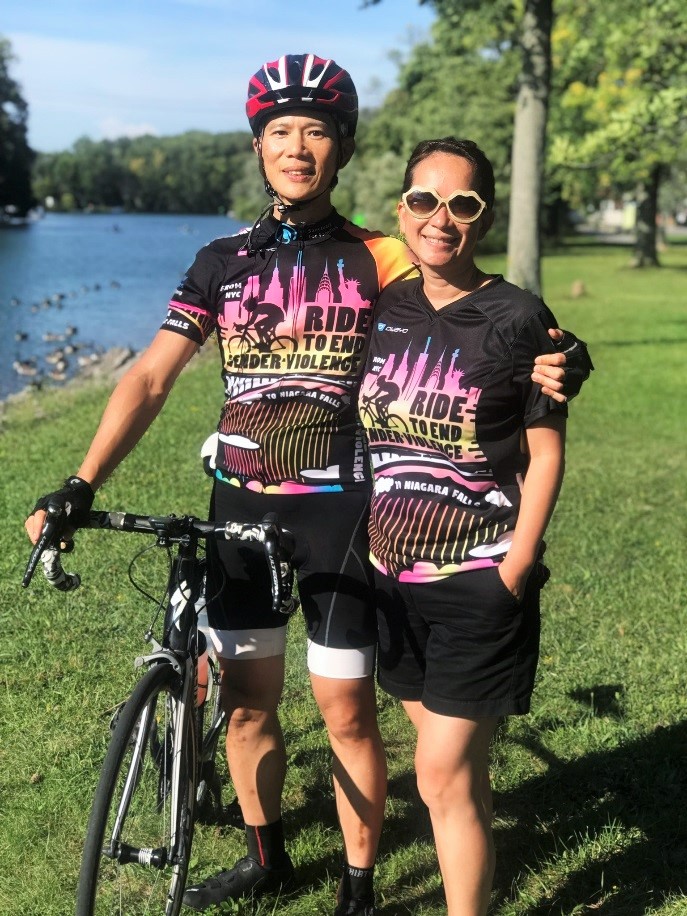
Nelson has been a cycling enthusiast ever since he got bitten by the bug many years ago doing his first ever charity ride in Sydney, Australia. Nelson did not even have his own bike, and did the 51 mile course on a woman’s hybrid. He even had to borrow a friend’s helmet. He has been hooked ever since – to the self-discipline, the training leading up to the event, and the sense of achievement at enduring for a worthy cause. Nelson has participated in multi-day charity bike events in Australia, Europe, and US ever since.
I am not really a cyclist but I share Nelson’s passion for charity. So I started volunteering as a support crew for these events. It feels great to be part of these amazing rides together as husband-and-wife and we have made many life-long friends along the way.
How did you find Sanctuary?
We moved from Sydney to New York four years ago, and I started volunteering at Sanctuary for Families. It is a really special place. The work Sanctuary is doing for victims of gender violence really made an impression on me, and I was especially impressed by the Economic Empowerment Program. Through volunteering I met John Wyeth, Sanctuary’s Director of Institutional Giving, and found out that he is also a cyclist. I introduced Nelson to him and the two became riding buddies and often ride together on weekends.
How did you come up with the idea to organize Sanctuary Ride?
The thought of doing something to help Sanctuary to raise awareness and break the cycle of gender violence had always been on our minds, and two years ago we thought it would be a good idea to combine our passions together and organize a charity bike ride for the cause. We spoke to a few like-minded friends, including John, and the Sanctuary Ride was born! We want the event to reflect the geographic base of Sanctuary – hence the route from New York City to Niagara Falls through the beautiful back roads of New York State.
What keeps you motivated during that long bike ride?
It is a tough ride, 500 miles in 5 days, with an elevation gain of 23,000 feet. However, in our mind, this is a small price to pay to support survivors of gender violence. I love that we are a group of like-minded people who believe in Sanctuary’s mission, and that we are not alone on this journey.
Last year we spoke to many people on the road about Sanctuary for Families, and were lucky enough to spread the words through NPR and Buffalo NBC news. It was an amazing five days even though we had to deal with a heat wave, leg cramps, bike issues, saddle sores, and scary descents going into Ithaca!
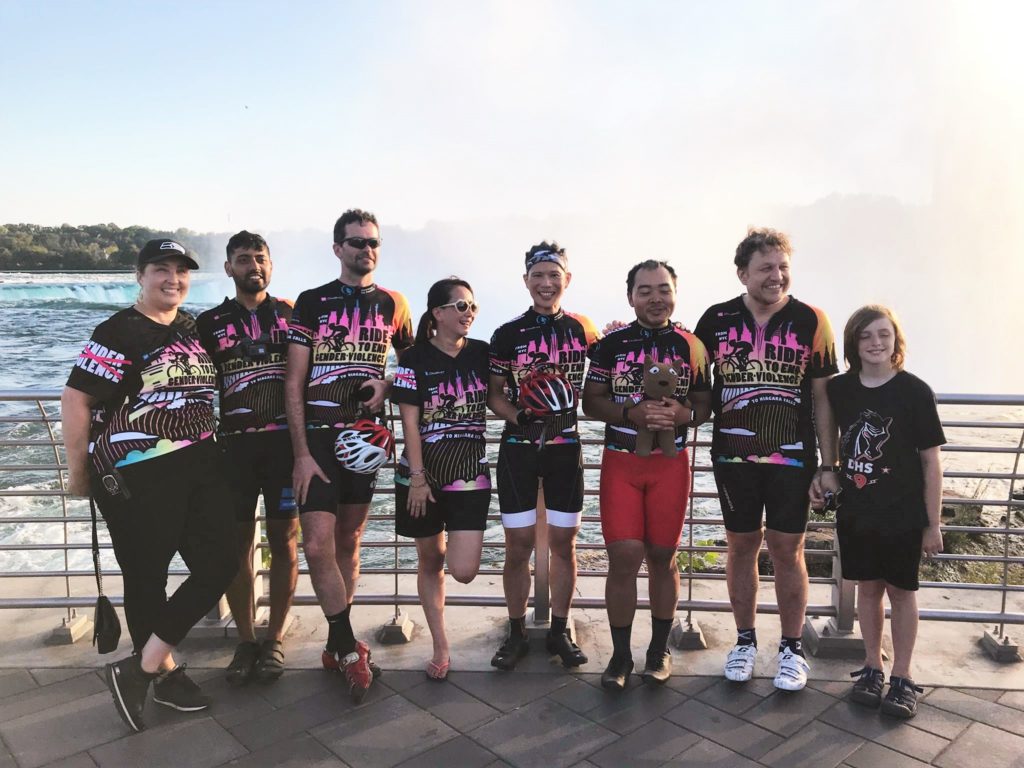
Both Nelson and I are super excited about this year’s Sanctuary Ride. We have eight wonderful riders and three support crew members from all backgrounds and different parts of the world, and we all share the same passion. I look forward to “rolling” nice and early on August 28th from Central Park, raising awareness of Sanctuary, and making unforgettable memories!
What is your favorite part of Sanctuary Ride?
It is the comradeship of a group of very different people coming together for one goal. I love that most people who participate in the event (both last year and this year) have actually never ridden 500 miles back to back. The riders have to train hard for not only the cause of raising awareness of gender violence, but also to achieve personal challenges. You can’t help but feel great to be part of this journey.
It is always a very emotional moment to arrive at Niagara Falls at the end of the 5 days. However scenery-wise my personal favorite is the 4th day where we ride along the beautiful Erie Canal.
Are you accepting new members?
Registration for the 2019 Sanctuary Ride has closed – the ride overlaps with the Labor Day long weekend therefore we have to book all our accommodation far in advance – but we are already thinking about next year. We’d love to welcome any interested riders to consider joining us in 2020!
Can cyclists participate in the event and not ride the full five days to Niagara Falls?
Friends asked this question a lot! We are considering having options for 1 day ride from New York to Poughkeepsie, as well as 1 day from Pittsford to Niagara Falls for Sanctuary Ride 2020 onwards. You are welcomed to come cheer us on and see us off at 5:30am on 8/28 though!
What advice would you have for someone who is interested in doing the ride?
Good spirit and positive energy is always a good place to start! Train hard and stay safe on the saddle. Nelson organizes group trainings on weekends leading up to the ride so the team get a sense of riding as a group and how to look out for each other.
How can interested cyclists contact you?
Please visit our Facebook page www.facebook.com/SanctuaryRide and leave us a message! We would love to have you in next year’s event. Let’s ride together to help end gender violence!
